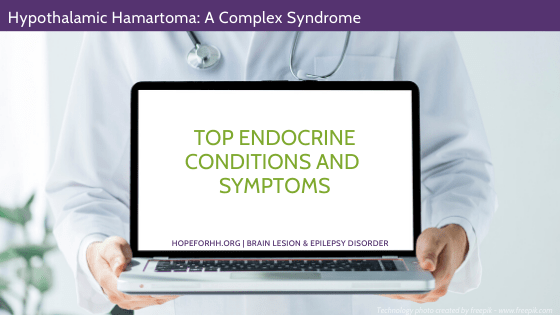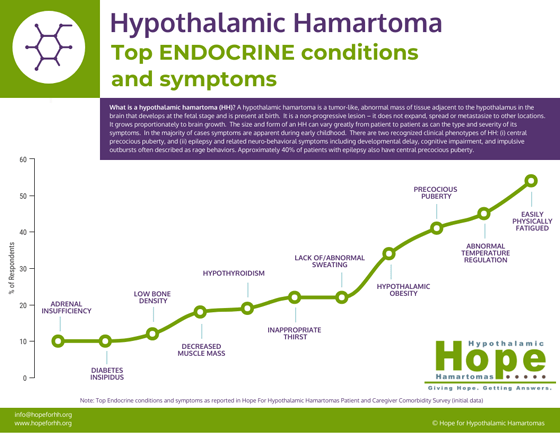
HH Comorbidity Survey – Initial Results
Today we continue our blog series discussing the initial results of the HH Comorbidity Survey on HH comorbidities, or co-existing conditions. We believe these symptoms and conditions may be un-diagnosed or under-diagnosed as a part of the HH Syndrome. If you have not read the first blog in this series where we talked about psychiatric and behavior symptoms reported by HH adults and Caregivers, you can catch up here.
In our blog today, we are focusing on the many complex and varied endocrine issues experienced both pre and post-treatment. We want to remind everyone that the information included in this blog is from the initial responses we have received from patients and caregivers, NOT as reported by the medical community. The whole point of this survey was to be able to collect information on symptoms or conditions as they are experienced and reported by individuals and caregivers. Some individuals have had official diagnoses and others have not. Our ultimate goal is to use this information to educate the medical community and improve both the diagnostic process and treatment outcomes. If you have not yet taken the time to participate in this short but extremely valuable survey – you can access the survey in multiple languages here [English] [Russian] [German] [French].
We are happy to report that this information has been shared with several endocrinologists dedicated to better defining the endocrine issues associated with HH. At our 4th International HH Research Symposium for medical professionals last Fall, Hope for HH presented the preliminary findings of the HH Comorbidity survey. Many clinicians and researchers were surprised by what was presented and very interested in learning more. Dr. Kevin Yuen, Dr. Oliver Oatman, and Dr. John Kerrigan have even drafted a professional research poster to be presented at Endo2020, an online endocrine conference being held in June. The virtual conference is available to the public for the first time – you can register to attend some of the presentations here. This will be the first time HH and endocrine issues will have a larger professional audience and sharing this information at such an event is a huge win!
So, let’s take a look at what you, the HH community, have shared in the survey.

Many of these conditions or symptoms are not surprising after surgery, as damage to the hypothalamus can trigger a cascade of hormonal imbalances. What was surprising to many endocrinologists was how many conditions were reported as occurring prior to surgery – without a known surgical trigger. Two conditions worthy of mentioning are Hypothalamic Obesity and Hypothyroidism. Most medical professionals previously believed these only occurred post-surgery.
This chart is not meant to be an all-inclusive list of endocrine issues associated with HH. We are sharing the top issues as reported by the HH community in this initial set of data. It is important to note that the hypothalamus plays a crucial role in the regulation of hormones, regulating body temperature and maintaining many daily physiological cycles. It links the nervous system to the endocrine system via the pituitary gland. Examples of other functions that may be impacted include; sleep cycles, blood pressure and heart rate, sex hormones, emotions, and appetite and weight control.
We hope by sharing this information with individuals and caregivers, it may help you to start a conversation with your endocrinologist. Testing can often be expensive and without obvious symptoms or an understanding of exactly how HH impacts the endocrine system – many endocrinologists are hesitant to test. We hope to change this and support you on your journey to comprehensive and successful treatment!
Other blogs about endocrine issues here:
Adrenall Insufficiency – Pituitary Awareness Month
Take the HH Comorbidity Survey Today
 |
 |
 |
 |
| French Survey | German Survey | Russian Survey | English Survey |





